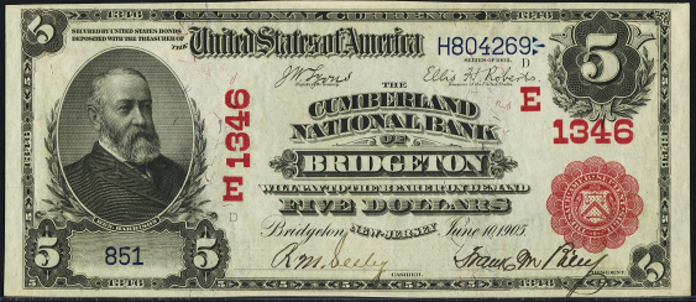Five Dollar Notes › Nationals › 1902 Five Dollar National Bank Notes › Michigan Charters › 1902 $5 Flint Michigan First National Bank
Get Value Now
| Item | Info |
|---|---|
| Series | 1902 |
| Charter | #10997 First National Bank of Flint, Michigan |
| Year Chartered | 1917, 194 Banks Chartered |
| City Info | Flint is the largest city and county seat of Genesee County, Michigan. Located along the Flint River, 66 miles northwest of Detroit, it is a principal city within the region known as Mid Michigan. According to the 2010 census, Flint has a population of 102,434, making it the seventh largest city in Michigan. The Flint metropolitan area is located entirely within Genesee County. It is the fourth largest metropolitan area in Michigan with a population of 425,790 in 2010. The city was incorporated in 1855. Source: Wikipedia |
| Similar Cities | If your note doesn't match try: 1. Flint, Michigan - First National Bank 2. Flint, Michigan - Citizens National Bank 3. Flint, Michigan - First National Bank 4. Mifflintown, Pennsylvania - First National Bank 5. Mifflintown, Pennsylvania - Juniata Valley National Bank 6. Flint, Michigan - National Bank of Flint 7. Flint Hill, Virginia - First National Bank |
| Seal Varieties | Red, Blue |
| See Also | If your note doesn't match try: 1. 1907 $5 Legal Tender 2. 1899 $5 Silver Certificates |
| Other Info | 1. Value depends on notes known for charter, condition and market demand. |
| Neat Fact | Plate letters A-D for Sheets of 5-5-5-5 (Friedbergs, 20th Ed. P 99) |
No Obligations Offers and Appraisals
Please submit a good photo or scan. It will be identified and evaluated. Understand there may be subtle differences between the image you see above and your note. Signatures, design, markings and note condition will determine the offer price. Notes in Uncirculated or better condition receive the best offers.
Appraisals can be estimated for wholesale and retail prices. Wholesale is what dealers typically pay. Retail is what a collector might pay. Retail is slightly higher in most cases.
Please visit this page for USA Paper Money Reference. Do not treat this page as a reference guide, it is for appraisal and acquisition purposes only.
